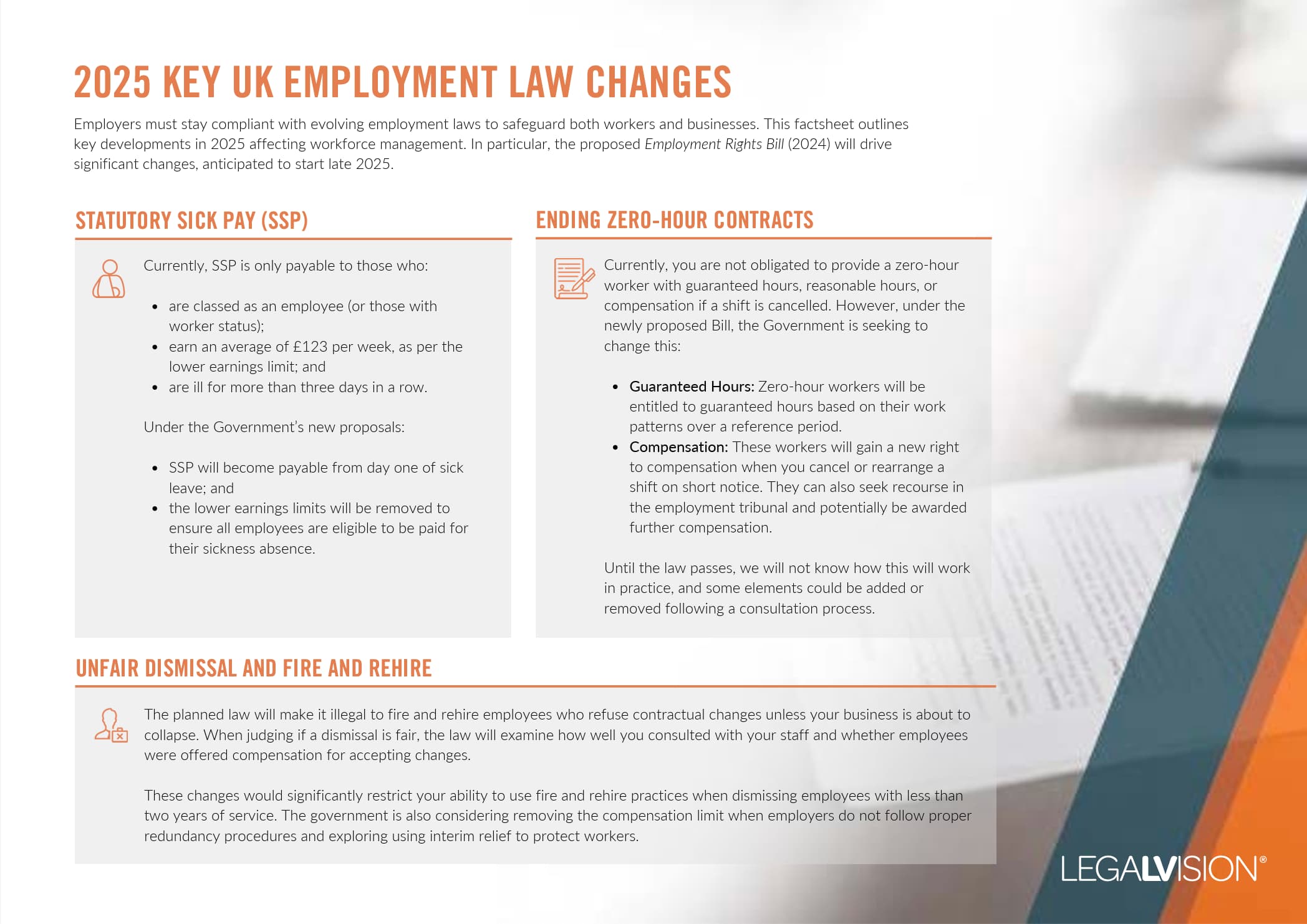In Short
- The Employment Rights Act 1996 protects employees’ rights, including notice for dismissal, redundancy, and parental leave.
- Employers must provide itemised payslips and adhere to regulations if the business becomes insolvent.
- Employers also gain protection, including against improper disclosures by employees.
Tips for Businesses
Ensure you meet your obligations under the Employment Rights Act, including notice periods, payslips, and protections for employees during significant events like insolvency or parental bereavement. Stay compliant to avoid potential claims and penalties.
Running a business can be a busy task and leaves little time for understanding the laws you must comply with. However, you must be aware of these and ensure you abide by them, including the employment law governing your employment relationship with your staff. Not meeting your legal obligations in employment legislation as an employer and granting employees their statutory rights means your staff may take you to an employment tribunal. This could result in you paying a large amount of compensation. Therefore, this article will explain the Employment Rights Act 1996 and the legal protections it offers your employees.
What is Employment Law?
Employment law governs the relationship between you as an employer and your employees and their trade unions. It outlines your rights as an employer, your employees’ rights, and your obligations towards them. Employment law can be found in legal acts, regulations, and statutory codes of practice.
What is the Employment Rights Act 1996?
The Employment Rights Act 1996 was created to update earlier employment laws. For example, the Wages Act 1986 and combine them into one act.
A significant purpose of the Act was to give workers more personal rights. Therefore, the Act details your employees’ rights in specific situations and areas of their employment.
For example:
- dismissal;
- unfair dismissal;
- protection of wages;
- zero-hour contracts;
- Sunday working;
- flexible working;
- Parental Leave; and
- redundancy.
What are the Main Provisions of the Employment Rights Act 1996?
The Employment Rights Act 1996 offers your employees many protections. Below, we look at some of these that you may still need to learn about.
For example, the Act allows an employee paid time off to carry out public duties and responsibilities such as jury service.

This factsheet outlines key developments in 2025 affecting workforce management.
Reason for Notice Before Dismissal
One protection the Act offers is that you have to give your employees ‘reasonable notice’ when terminating their contracts. The notice period depends on how long the employee has worked for you.
This is as follows:
- at least one week for those who have worked for at least one month;
- at least two weeks for those who have worked at least two weeks; and
- at least three weeks for those who have worked for at least three years.
The pattern increases by week for up to 12 months. However, if your employment contract allows, you can provide a payment in lieu of notice instead of giving this notice.
Protection if an Employer Becomes Insolvent
You may not be aware of the protection the Employment Rights Act 1996 offers to your employees if your business becomes insolvent.
Itemised payslips
A protection you may not be aware of in the Act is that it obligates you to provide all your workers with itemised payslips. This means that your payslip must record the following information:
- how many hours they work; and
- the rate of pay for their hours worked.
Parental Bereavement Leave
You may not already know that the Act obligates you to protect your employees when they suffer a stillbirth and when their child passes away. It allows them time off to grieve for their loss.
Does the Employment Rights Act 1996 Offer Employers Any Protection?
The Employment Rights Act 1996 also offers employers, i.e. yourself, protection, so it is not solely for your employees.
For example, it provides you with protection against disclosures and detriment. This means it prohibits your workers from telling anyone about your business or providing information where that person is a third party.
Key Takeaways
Employment law is in place to regulate the relationships between employers like you and employees. It also spells out your obligations and rights, and one piece of legislation is the Employment Rights Act 1996. This protects your employees from various areas of employment, such as parental leave and redundancy. This article has explained some areas of the Act that you may not be aware of.
For example, it offers protection for your employees if your business becomes insolvent and you have to provide itemised payslips for them. It also offers protection to you as an employer in terms of disclosure and detriment.
If you need help understanding the Employment Rights Act 1996 and the legal protections it offers your employees, our experienced employment solicitors can assist as part of our LegalVision membership. For a low monthly fee, you will have unlimited access to lawyers to answer your questions and draft and review your documents. So call us today on 0808 196 8584 or visit our membership page.
Frequently Asked Questions
The Employment Rights Act 1996 is an employment law that gives employees rights such as dismissal and flexible working.
Employment law governs the relationship between you and your employees, giving you both rights and outlining your mutual obligations.
We appreciate your feedback – your submission has been successfully received.











